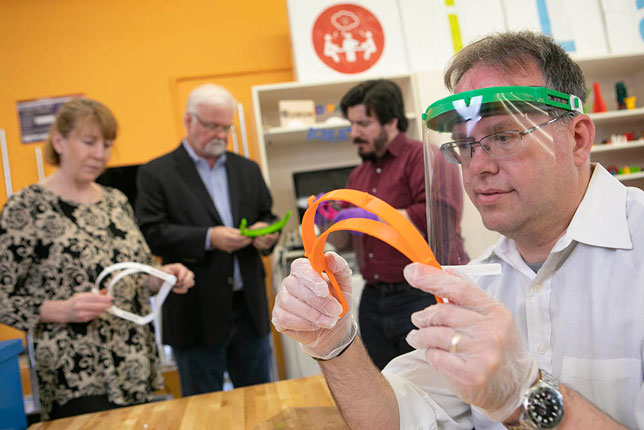Colleges Pitch in to 3D Print Medical Gear
- By Dian Schaffhauser
- 03/26/20
Colleges all over the country are helping out COVID-19 response efforts by producing health equipment with their 3D printers, including face shields and respirator masks.
Tennessee's Governor, Bill Lee, enlisted colleges and universities in his state to use their 3D printing capacity to create face shields. The facilities will produce a combined 1,500 to 2,000 shields, which will be collected and distributed at Austin Peay State University. A student at Austin Peay came up with the prototype, which was reviewed and approved by health professionals. From there, the design "was sent all over the state to various universities to start printing," said Mike Wilson, director of the university's GIS Center.
The face shields have three parts: a 3D-printed shield frame, an acetate face shield and an elastic band. Ten universities and technical colleges across the state are printing the frames and sending them to Austin Peay, where the GIS Center will pair them with the acetate shields and elastic bands for packaging. The packages will include 20 acetate shields for each unit, to allow medical workers to replace their shields after each patient.
Wilson said he hopes to be able to ship a thousand face shields with 20,000 replaceable acetate shields this week. Each shield frame takes about two hours to print, and each acetate shield takes a minute or two to cut.
The same center is also trying to figure out a way to build filtering face masks. The hold-up there is that it hasn't found a "viable filter material" that's safe enough for medical work. "We're trying to come up with a mask that acts like an N95 (respirator) mask," said Wilson.
"They Need the Masks Now"
That isn't stopping Concordia University Wisconsin, where the campus makerspace is printing N95 respirator masks 24 hours a day on its 30 machines. These are being classified as "prototypes" at this point, since what the makerspace has come up with isn't certified by the National Institute of Occupational Safety and Health. That's no deterrent.
"We're hearing from the medical community that they need the masks, and they need them now," said Dan Sem, dean of Concordia's Batterman School of Business, said in an article about the project. "Our goal is to get these N95 prototypes produced and delivered as quickly as possible to keep the medical professionals using them as safe as possible. The internal experts at the health care institutions are aware of the certification limitation and are doing their own assessments, but they need the masks now."
The university has also enlisted local companies and community members with their own 3D printing resources to join in the effort by registering their printing capacity.
Once the printing is done, the Milwaukee Police Department will rally their officers to volunteer to deliver the products to Children's Hospital and other health organizations in the area.
Cobbling Together Supplies
At New York's Stony Brook University, the school's makerspace and incubator, iCreate, is making face shields, which have been reviewed by the university hospital's personnel for medical compliance. The design includes replaceable parts so that workers can change them out, allowing for a more sanitized product, according to the institution.

iCreate Director David Ecker holds a face shield produced at the makerspace. Source: Stony Brook University
Startup wasn't easy, according to David Ecker, director of iCreate. "We didn't have all of the materials that we needed so we went to Home Depot and found some door insulation material," he explained in a university article. "That's what we're using for the forehead cushion. The plastic shield on the facemask is what you would typically use if you bound a folder for a presentation. It's clear plastic. We had to go to Jo-Ann Fabric and Craft store to get the elastic. We found other things we needed at Staples. So we're improvising here, but in the end, it's going to be an excellent, viable product for our medical professionals."
With the current supplies on hand, iCreate expects to be able to produce about 800 face shields, and the hopes to procure enough materials to produce another 5,000.
The university estimated that one 3D printer can produce one face shield in about four hours. Stony Brook has 20 machines that can be applied to this project at any given time, which means it can make 40 face shields a day.
"We are doing something positive to protect the health of the medical professionals that are helping the community," said Stony Brook's Charlie McMahon, interim senior vice president and enterprise CIO. "Being able to be a part of keeping our medical professionals safer is a really good feeling."
About the Author
Dian Schaffhauser is a former senior contributing editor for 1105 Media's education publications THE Journal, Campus Technology and Spaces4Learning.